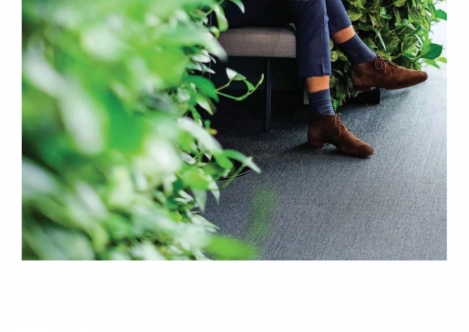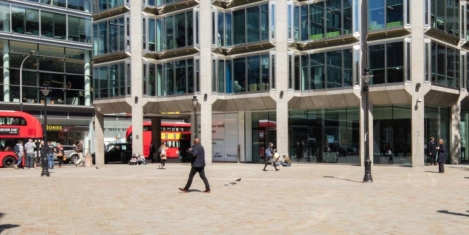February 6, 2019
![]()
About Mark Eltringham
Posts by Mark Eltringham:
February 6, 2019
Green Building Council sets out to define net zero carbon building
by Mark Eltringham • Environment, News
 The UK Green Building Council has published a consultation paper inviting feedback on a proposed definition for net zero carbon buildings. The consultation sets out the initial proposals from the Net Zero Carbon Buildings Task Group which is developing a framework definition in line with the ambitions of the Paris Climate Agreement.
The UK Green Building Council has published a consultation paper inviting feedback on a proposed definition for net zero carbon buildings. The consultation sets out the initial proposals from the Net Zero Carbon Buildings Task Group which is developing a framework definition in line with the ambitions of the Paris Climate Agreement.
February 4, 2019
Businesses need to build far more employee trust in their use of workforce data
by Mark Eltringham • News, Technology, Workplace
 Business leaders need to improve the way they implement and communicate responsible workforce data strategies if they are to build the employee trust that will help generate sustained revenue growth, according to a new report from Accenture. The report, Decoding Organizational DNA, is based on qualitative and quantitative research, including global surveys of 1,400 C-level executives and 10,000 workers across 13 industries.
Business leaders need to improve the way they implement and communicate responsible workforce data strategies if they are to build the employee trust that will help generate sustained revenue growth, according to a new report from Accenture. The report, Decoding Organizational DNA, is based on qualitative and quantitative research, including global surveys of 1,400 C-level executives and 10,000 workers across 13 industries.
February 1, 2019
Millennial headlines, eternal workplace truths, the pathologisation of sitting and some other stuff
by Mark Eltringham • Facilities management, Features, Technology, Wellbeing, Workplace design
 The New York Times asked an interesting question this week. “Why Are Young People Pretending to Love Work?” it demanded, begging the immediate response ‘for the same reason everybody else does’. If only that pat, facetious response were enough to satisfy the actual questions concealed by the typically misleading headline. What the article actually wants to know is why some members of one particular tribe of young people have a toxic relationship with work. And that tribe (of course) is made up of the diverse, attractive, urbanite, coffee-fixated, stock image Millennials working for the world’s tech giants. Interesting in so far as it goes, but this tribe is not homogeneous to begin with and does not represent the world’s ‘young people’. It’s beyond time we stopped working on the basis that it does. Change the headlines.
The New York Times asked an interesting question this week. “Why Are Young People Pretending to Love Work?” it demanded, begging the immediate response ‘for the same reason everybody else does’. If only that pat, facetious response were enough to satisfy the actual questions concealed by the typically misleading headline. What the article actually wants to know is why some members of one particular tribe of young people have a toxic relationship with work. And that tribe (of course) is made up of the diverse, attractive, urbanite, coffee-fixated, stock image Millennials working for the world’s tech giants. Interesting in so far as it goes, but this tribe is not homogeneous to begin with and does not represent the world’s ‘young people’. It’s beyond time we stopped working on the basis that it does. Change the headlines.
February 1, 2019
Employee experience of the workplace does not match employer rhetoric, claims report
by Mark Eltringham • News, Workplace
 A new report (registration needed), based on a survey of UK employers and employees, claims to reveal a significant and increasing gap between employees’ experience of being employed and what employers believe this experience to be. Barnett Waddingham’s four research papers claims that while the majority of employers (61 percent) believe the levels of wellbeing in their organisation to be high, only 19 percent of the employees surveyed report high wellbeing. According to the authors, this suggests employers do not sufficiently know or understand the needs of their people.
A new report (registration needed), based on a survey of UK employers and employees, claims to reveal a significant and increasing gap between employees’ experience of being employed and what employers believe this experience to be. Barnett Waddingham’s four research papers claims that while the majority of employers (61 percent) believe the levels of wellbeing in their organisation to be high, only 19 percent of the employees surveyed report high wellbeing. According to the authors, this suggests employers do not sufficiently know or understand the needs of their people.
January 29, 2019
Northern English cities bear brunt of government spending cuts
by Mark Eltringham • Cities, News
 The UK’s cities, and especially those in the North of England have borne nearly three-quarters (74 percent) of all real-terms local government funding cuts in the last decade despite being home to just 54 percent of the population, according to Centre for Cities’ annual Cities Outlook 2019 report – the Centre’s annual health check on UK city economies. This is equivalent to a reduction of £386 per city dweller since 2009/10, compared to £172 per person living elsewhere. Cities Outlook 2019 reveals a clear geographical divide in where cuts to cities have fallen, with the top five worst affected cities all located in the North of England.
The UK’s cities, and especially those in the North of England have borne nearly three-quarters (74 percent) of all real-terms local government funding cuts in the last decade despite being home to just 54 percent of the population, according to Centre for Cities’ annual Cities Outlook 2019 report – the Centre’s annual health check on UK city economies. This is equivalent to a reduction of £386 per city dweller since 2009/10, compared to £172 per person living elsewhere. Cities Outlook 2019 reveals a clear geographical divide in where cuts to cities have fallen, with the top five worst affected cities all located in the North of England.
January 28, 2019
The bumpy road to automation, dancing elephants, free beer and some other stuff
by Mark Eltringham • Features, Flexible working, Property, Technology, Wellbeing
 The World Economic Forum’s Annual Summit in Davos offers the world’s elite the chance to rub shoulders and address important themes of capitalism and society. Its output has largely consisted of making assured noises about Big Subjects, and especially globalisation and the effects of technology on the economy, now typically framed around the current / imminent Fourth Industrial Revolution™.
The World Economic Forum’s Annual Summit in Davos offers the world’s elite the chance to rub shoulders and address important themes of capitalism and society. Its output has largely consisted of making assured noises about Big Subjects, and especially globalisation and the effects of technology on the economy, now typically framed around the current / imminent Fourth Industrial Revolution™.
January 28, 2019
Majority of large UK firms to address climate change in annual reporting
by Mark Eltringham • Environment, News
 Two-thirds (67 percent) of UK corporations will be disclosing climate change related risks and opportunities in their 2019 annual reporting, according to new figures released by the Carbon Trust. However, fewer than a quarter (23 percent) of companies are expecting to fully report in line with the recommendations of the G20 Financial Stability Board’s Task Force on Climate-related Financial Disclosures (TCFD), released in June 2017. (more…)
Two-thirds (67 percent) of UK corporations will be disclosing climate change related risks and opportunities in their 2019 annual reporting, according to new figures released by the Carbon Trust. However, fewer than a quarter (23 percent) of companies are expecting to fully report in line with the recommendations of the G20 Financial Stability Board’s Task Force on Climate-related Financial Disclosures (TCFD), released in June 2017. (more…)
January 28, 2019
UK leading the way in digital transformation strategy
by Mark Eltringham • News, Technology
 IT consultancy Infosys has released new research, the Infosys Digital Radar 2019, which it claims reveals the digital transformation maturity of businesses around the world in 2018, and what it takes to navigate the next stage of their journey. Its main claim is that to become digitally advanced, organisations need to run multiple digital initiatives at scale at the same time. It suggests that organisations in the UK are now significantly ahead of the global average when it comes to their digital transformation, including countries like the United States and Germany.
IT consultancy Infosys has released new research, the Infosys Digital Radar 2019, which it claims reveals the digital transformation maturity of businesses around the world in 2018, and what it takes to navigate the next stage of their journey. Its main claim is that to become digitally advanced, organisations need to run multiple digital initiatives at scale at the same time. It suggests that organisations in the UK are now significantly ahead of the global average when it comes to their digital transformation, including countries like the United States and Germany.
January 25, 2019
People who experience early redundancy have poor health in later life
by Mark Eltringham • News, Wellbeing
 People who involuntarily lose their job early in their career have poorer health in later life, according to new findings from the University of Kent in the UK and the University of Bamberg in Germany. Researchers, including Dr Olena Nizalova from the Centre for Health Service Studies (CHSS) within the School of Social Policy, Sociology and Social Research (SSPSSR) at Kent, set out to establish what the long-term implications of enforced unemployment are on individuals over the course of their life, particularly in later life.
People who involuntarily lose their job early in their career have poorer health in later life, according to new findings from the University of Kent in the UK and the University of Bamberg in Germany. Researchers, including Dr Olena Nizalova from the Centre for Health Service Studies (CHSS) within the School of Social Policy, Sociology and Social Research (SSPSSR) at Kent, set out to establish what the long-term implications of enforced unemployment are on individuals over the course of their life, particularly in later life.
January 24, 2019
Cambridge continues to attract science and technology firms
by Mark Eltringham • News, Property
 A new report claims that Cambridgeshire continues to attract science and technology companies despite the current Brexit uncertainty. The analysis (registration required) from Bidwells of the Cambridge office and laboratory market claims that 0.6 million sq ft of new space will be complete during the first half of 2019. This is the highest level of new supply in over a decade. This perhaps sounds alarm bells given the apparent slowdown in demand for labs and offices combined to 1.154 million sq ft at the end of 2018. (more…)
A new report claims that Cambridgeshire continues to attract science and technology companies despite the current Brexit uncertainty. The analysis (registration required) from Bidwells of the Cambridge office and laboratory market claims that 0.6 million sq ft of new space will be complete during the first half of 2019. This is the highest level of new supply in over a decade. This perhaps sounds alarm bells given the apparent slowdown in demand for labs and offices combined to 1.154 million sq ft at the end of 2018. (more…)
January 23, 2019
Landsec becomes latest major property firm to offer coworking space
by Mark Eltringham • Company news, Coworking, Property
 Landsec has launched its new flexible office brand, Myo, which it claims will provide customised office space for businesses looking for flexibility to enable future growth from April of this year. Coworking in other words. The move is the latest example of a major commercial property firm entering the market for flexible offices and coworking space in the wake of its recent boom. Myo will operate as a standalone brand, offers flexible leases ranging from 12 months to three years for businesses that need space for between 15 and 80 people.
Landsec has launched its new flexible office brand, Myo, which it claims will provide customised office space for businesses looking for flexibility to enable future growth from April of this year. Coworking in other words. The move is the latest example of a major commercial property firm entering the market for flexible offices and coworking space in the wake of its recent boom. Myo will operate as a standalone brand, offers flexible leases ranging from 12 months to three years for businesses that need space for between 15 and 80 people.



























